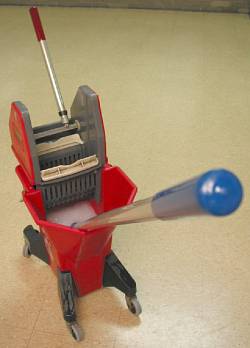I was stumbling around looking for an article on the Web and found this courageous piece in Chronicles Magazine entitled America's Descent Into the Third World. Paul Craig Roberts dismantles recently created jobs and finds that the upbeat economic news we hear of late resembles the Emperor's latest threads. This article is must-read for those of you who read through my series on the business world.
I wonder from time to time if our economic leaders are flat-out lying to us to keep us from panicking. Honestly. Alan Greenspan recently let it be known that he has no idea why the economy is acting the way it is. If he doesn't understand what is going on, then no one does. That's never a positive sign.
The spin our economy is getting is bizarre, too. The Wall Street Journal yesterday was trumpeting the roaring economy noting that Americans are spending more again and that GM and Ford's sales are up more than 40% over last year. But in the same edition in different articles, they also note that Americans are now saving nothing. Nada. Everything we make goes out. And the numbers behind GM and Ford? Well, they are effectively selling almost all of their cars at a loss, unable to cover their expenses. That's not a great business plan.
When you start unpacking all the "good" economic and business news, you find the kinds of statistics that Paul Craig Roberts did:
[In the June 2005 jobs report, only] 144,000 private sector jobs were created, each one of which was in domestic services.
Fifty-six thousand jobs were created in professional and business services, about half of which are in administrative and waste services.
Thirty-eight thousand jobs were created in education and health services, almost all of which are in health care and social assistance.
Nineteen thousand jobs were created in leisure and hospitality, almost all of which are waitresses and bartenders.
Membership associations and organizations created 10,000 jobs, and repair and maintenance created 4,000 jobs.
Financial activities created 16,000 jobs.
This most certainly is not the labor market profile of a First World country, much less a superpower.
We are fast becoming a country of waiters, secretaries, and janitors. This is not to say that these jobs are not needed,  but only that they cannot sustain America. Roberts's later comments on white collar work are especially telling. Again, read the whole article (even if you've heard the same warnings from me already.)
but only that they cannot sustain America. Roberts's later comments on white collar work are especially telling. Again, read the whole article (even if you've heard the same warnings from me already.)
The American Church's silence on this is becoming pathological. If we cannot speak to the business world, if we cannot prepare for bad times, if we cannot shout truth in the face of lies, if we cannot bring hope to those who continue to slide downward, if we cannot bring peace to the frantic, then are we really bringing anything redemptive to anyone's work life?
Just this week the guys from my small group were discussing the fact that we are all harried, stressed out, torn in a million directions, estranged time-wise from our families, and working harder than ever for less. Each man had a complaint that was different from the rest, but we were all united in the fact that our problems here went back to the same single issue that the Church in America refuses to discuss. Something has to give.
I'll leave it to readers to imagine what's next. Are we ready for it?


 It doesn’t take a genius to see that something is drastically wrong at the very heart of our daily living. After reading Brad over at The Broken Messenger blogging about the American Dream and how it is destroying us through our materialism and outright stinginess toward tithing, I have to wonder if the cure we Christians are offering is just a Band-Aid pasted over something gangrenous.
It doesn’t take a genius to see that something is drastically wrong at the very heart of our daily living. After reading Brad over at The Broken Messenger blogging about the American Dream and how it is destroying us through our materialism and outright stinginess toward tithing, I have to wonder if the cure we Christians are offering is just a Band-Aid pasted over something gangrenous.
 I’m not entirely through the book, but I’ve already got a knot in my chest because he’s talking about the same deep need that I am for real community.
I’m not entirely through the book, but I’ve already got a knot in my chest because he’s talking about the same deep need that I am for real community.